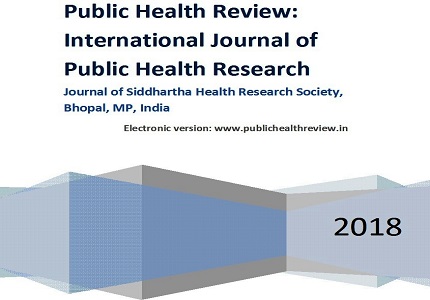Biomedical waste handling and knowledge of its health hazards among waste handlers in a tertiary hospital in Sokoto, Nigeria
Abstract
Background: Biomedical wastes have negative effects on human health and environment; there fore all persons exposed to the waste are potentially at risk, especially waste collectors that handle poorly segregated and containerized waste. The study aim was to describe the pattern of biomedical waste handling and assess knowledge of its health hazards among handlers in a Tertiary Hospital in Sokoto, Nigeria.
Materials and Method: A descriptive cross-sectional study design was used. A total of 180 waste handlers were selected using a simple random sampling method and close-ended interviewer-administered questionnaires were used to collect data. Data was analyzed using SPSS version 23.0 and result presented in table.
Results: Nearly half of the respondents were aged between 25-29 years and majority (81%) of the waste handlers are private employees while the public employees accounted for 19%.Wastes from different unit of the hospital were poorly segregated and commonly collected using inappropriate containers without lining. Although only 11% of the respondents received training on waste handling, 98%had good knowledge of health hazards of biomedical waste.All the handlers reported wearing personal protective equipment when handling biomedical waste but only 19% were on PPE during work through inspection.
Conclusion: Biomedical wastes from different units were poorly segregated and collected using inappropriate containers. Nearly all the respondents had good knowledge of its health hazards but only few (11%)had received training on biomedical waste handling. Waste should be properly segregated into appropriate containers, PPE to be made readily availability and ensure compliance to their use.
Downloads
References
2. National Institute for occupational safety and health (NIOSH). Preventing occupational exposure to antineoplastic and other hazardous drugs in health care settings.
3. Habibullah J, Ahmad K, and Khan MA: Managing the healthcare solid waste in selected districts of Punjab, Pakistan. Pak J Med Sci. 2010, 26 (4):795-799.
4. World Health Organization. Management of waste from injection activities at the district level: guidelines for district health managers. Geneva, Switzerland: World Health Organization; 2006.
5. World Health Organization. Unsafe injection practices and transmission of blood borne pathogens. Bull. World Health Organization. 1999; 77: 787-819. [PubMed]
6. Townend WK, Cheeseman CR. Guidelines for the evaluation and assessment of the sustainable use of resources and of wastes management at healthcare facilities. Waste Manag Res. 2005 Oct;23(5):398-408. [PubMed]
7. Akinwale C, Sridhar MKC. Increase in healthcare facilities and rapid environmental degradation. A technical paradox in Nigeria’s urban centers. Afr J Environ Sci Technol. 2010; 4 (9): 577-85.
8. Ngwuluka N, Ochekpe N, Odumosu P, John SA. Waste management in healthcare establishments within Jos metropolis, Nigeria. Africa Journal of Environmental Science and Technology. 2009; 3 (12): 459-465.
9. Pasupathi P et al. Biomedical Waste Management for health care industry. International Journal of Biological and Medical Research. 2011; 2(1): 472-86.
10. Sood AG, Sood A. Dental perspective on biomedical waste and mercury management: a knowledge, attitude, and practice survey. Indian J Dent Res. 2011 May-Jun;22(3):371-5. doi: 10.4103/0970-9290.87055.
11. Kirkwood RB and Jonathan AC. Essential Medical Statistics. Massachusetts, USA, Blackwell Publishing Ltd, 2nd Edition. 2003: 423.
12. Mathur V, Dwivedi S, Hassan M, Misra R. Knowledge, Attitude, and Practices about Biomedical Waste Management among Healthcare Personnel: A Cross-sectional Study. Indian J Community Med. 2011 Apr;36(2):143-5. doi: 10.4103/0970-0218.84135.
13. Imaad Mohammed Ismail, Annarao G. Kulkarni, Suchith V. Kamble, Sagar A. Borker, Reka R and Amruth M. Knowledge, attitude and practice about bio-medical waste management among personnel of a tertiary health care institute in Dakshina Kannada, Karnataka. Al Ameen J Med Sci 2013; 6(4):376-380.
14. NabarunKarmakar, Shib Sekhar Datta, AnjanDatta, Kaushik Nag, Kaushik Tripura, Partha. A cross-sectional study on knowledge, attitude and practice of biomedical waste management by health care personnel in a tertiary care hospital of Agartala, Tripura. National Journal of Research in Community Medicine. 2016; 5(3):189-195.
15. ShashwatiNema, Akansha Singh, Kiran Tripathi, Pallavi Shidhaye, Ashok Kumar Dhanvijay. Biomedical Waste Management: A Study of Knowledge, Practices and Attitude among Health Care Personnel at a Tertiary Care Hospital in Bhopal, Central India. JMSCR 2015;3(5):5844-5855.2.
16. S. Sangeetha Balamurugan, Priyadarsini.S.P, Renusha Justin, Rupa Priyadarshini Sonai, Rajeswari. B, Ramit Chakraborty. A Descriptive Study on Knowledge Regarding Biomedical Waste Management among Health Care Personnel in a Tertiary Care Hospital. National Journal of Research in Community Medicine. 2014; 3 (2):186-191.
17. Patil GV, Pokhrel K. Biomedical solid waste management in an Indian hospital: a case study. Waste Manag. 2005;25(6):592-9.
18. Lehtinen L. Occupational Health and Safety. African Newsletter on Occupational Health and Safety. 2002; 12: 32-34.
19. Mohammad Abul Bashar Sarker , Harun-Or-Rashid ,TomoyaHirosawa , Shaheen Bin Abdul Hai, RuhulFurkan Siddique, Junichi Sakamoto, Nobuyuki Hamajima. Evaluation of Knowledge, Practices, and Possible Barriers among Healthcare Providers regarding Medical Waste Management in Dhaka, Bangladesh .Med Sci Monit. 2014; 20: 2590-2597. [
20. Mburu Moses NguthuGikunju Joseph K. Onguso M. Justus Wakibia Joseph. Occupational Safety and Health Accidents among Biomedical Waste Handlers in Nairobi County. Journal of Environment and Earth Science. 2016; 6 (10):8-17.

Copyright (c) 2018 Author (s). Published by Siddharth Health Research and Social Welfare Society

This work is licensed under a Creative Commons Attribution 4.0 International License.


 OAI - Open Archives Initiative
OAI - Open Archives Initiative


